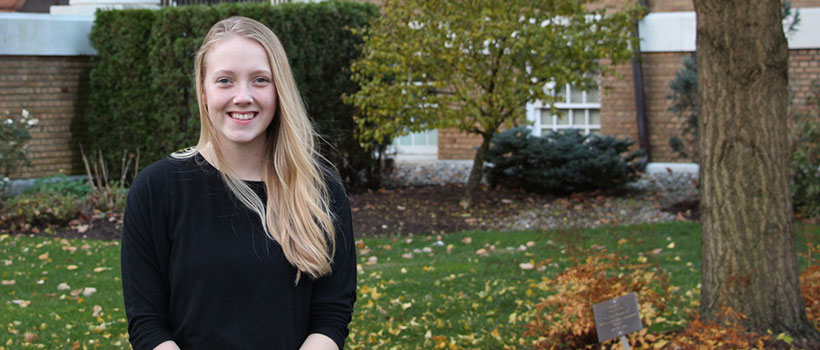
Madison Schettig ’21 applies the skills she is learning in Cedar Crest College’s criminal justice program to her work as a public safety analyst for the Allentown Police Department. “If you had asked me a year ago, I would have told you this is my dream job,” says Madison, who started working professionally in crime mapping before finishing her undergraduate studies. She plans to graduate in May 2021—completing her bachelor’s degree in criminal justice and certificate in crime and community mapping in just three years.
Graduating high school with a class of fewer than 200 students, Madison hoped to find a college community with a similar close-knit feel. “Cedar Crest fit that more than any of the other schools I looked at,” she explains. “I like being local and close to home, and I felt like the programs here were the best for me.”
Madison began her journey at Cedar Crest pursuing psychology until one course changed both her academic and professional trajectory—Introduction to GIS and Crime Mapping, taught by Scott Hoke, Ph.D., associate professor of criminal justice and director of the Master in Crime Science program. “I think my ‘aha!’ moment was in that class. I enjoyed it a lot,” she says. In fact, Madison always had an interest in learning more about crime and working in the criminal justice field. “My mom likes to credit my major, and now my job, to her always playing shows like ‘Law and Order: Special Victims Unit,’” she adds, laughing.
Criminal justice at Cedar Crest College is a distinctive, behavioral-based program taught by criminal justice experts. The program primes students for a career in crime prevention—taking a unique focus on the influences of criminal behavior. According to Madison, the courses provide valuable career insights, and the professors connect with students to create a family feel.
“The required courses really provide students with a deeper understanding of the field,” says Madison. “One of these is an ethics course, which is incredibly important, and gave me insight into life and the criminal justice field.” The program also recently added a probation and parole course, which gives students the opportunity to explore a subset of criminal justice without having to spend years working in the field to determine their fit.
The program’s small size allows for individualized attention, creates the close-knit community feel that Madison values and provides ample opportunities for students and faculty to connect. Before the COVID-19 pandemic and beginning her role with the Allentown Police Department, Madison worked for Hoke in the field of crime mapping, where she was able to work with police data provided by departments in partnership with the College.
“Madison was one of the most highly motivated students I have worked with during my time at Cedar Crest. I think early on in her career she was exposed to something that she found interesting and just took it to another level. She was so inquisitive that I had difficulty challenging her. Near the end of her career, I would actually have her work on skills that I was not familiar with. She really excelled in that area. She was so motivated that she eventually was able to teach me some of the more complicated mapping skills and processes,” says Hoke.
Hoke and Kerrie Baker, Ph.D., professor of psychology, are currently working with the Director of the S.P.O.R.E. unit (Special Program for Offenders in Rehabilitation and Education) in Lehigh County to develop a number of assessment tools to measure officer learning and behavior. Through these local partnerships, Hoke learned the Allentown Police Department was in need of a crime analyst and encouraged Madison to apply for the job. After a lengthy interview process, Madison was offered the position and started in her new role in October 2020.
“Many students are fortunate enough to be hired upon graduation, but Madison was hired in a professional capacity eight months before her graduation. In my entire professional and academic career, I have never seen that happen. That is a tribute to her skill and dedication as a student,” adds Hoke.
As a public safety analyst, Madison analyzes data in a variety of settings and applies her crime mapping knowledge. “I can take 10 years’ worth of data and look to determine what crimes are popular, or even what times of day or months of the year are popular for certain crimes,” she explains. Madison also helps fulfill requests from outside the department. For example, if a news station is looking for statistics to use in a story, she can help answer their questions and work with them to understand the data. Additionally, Madison assists with the analysis of officers—monitoring their activity and making sure everything is running smoothly. She adds that the department is also getting a new records management system, and she has been helping design the website and organize the data.
“I’m blessed to be able to work with people who are absolutely amazing and that my needs as a student can be met,” says Madison. The department has provided the flexibility Madison needs to work while still pursuing her undergraduate degree. “They’ve created an environment where I’m excited to come to work every day, and I want to be there. Not everybody gets that with their job,” she adds. She is grateful for the opportunity to enter the criminal justice and crime mapping fields, build professional relationships and gain valuable experience that will help inform her career journey.
When thinking about her journey ahead, Madison considers eventually returning to school to pursue a master’s degree in geographic information systems (GIS), a field using spatial and geographic data to map and analyze real-world problems. “I’ve always had a passion for learning and I never want to stop growing and exploring new avenues,” she explains.
“Madison’s potential is unlimited. She is ambitious, excited and motivated. I could not think of a better recipe for success,” concludes Hoke.